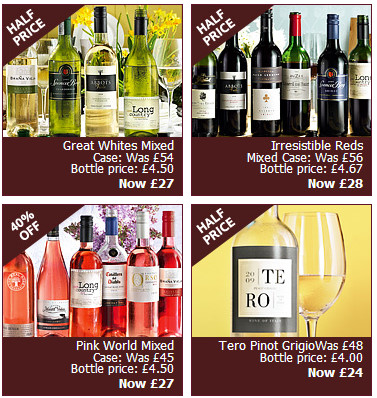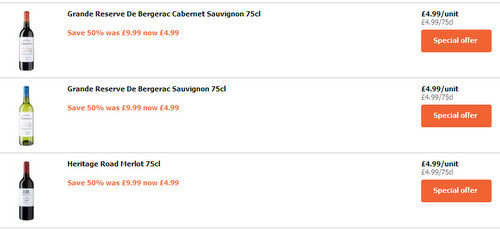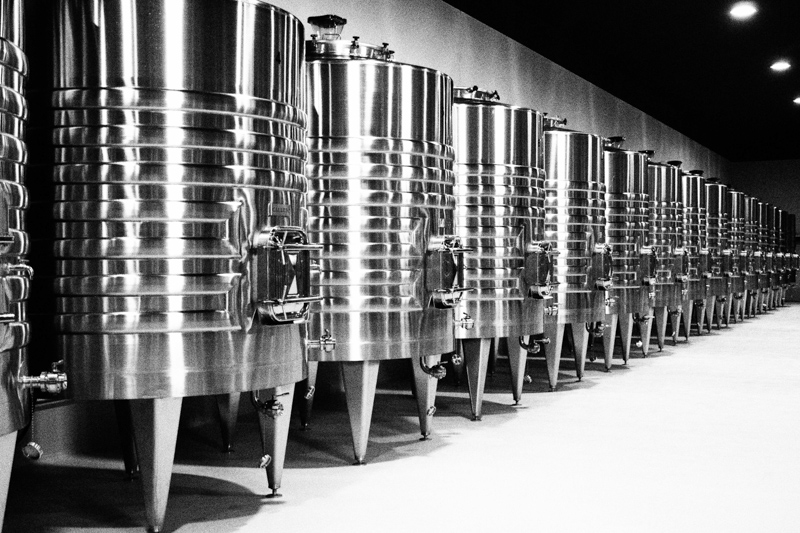Would it be a terrible idea to ban alcohol promotions?
I was filming again with the BBC today, on the subject of tactical brands (or trade drivers, or whatever you want to call them). These are inexpensive wines that are dressed up to look like, say, £10 bottles, and which are then sold ‘half price’ for £5. Consumers love them, but I think it’s a somewhat dubious practice. What happens when someone buys the wine at full price? And do sales of these wines cannibalize those of wines sold at a genuine price?
The problem with deep discounts and price promotion is that it’s the lazy way to sell wine. Go down a supermarket aisle and the only buying cues for punters are the money-off stickers and shelf barkers. We’re becoming a nation of promotion junkies.
What would happen if price promotions on alcohol were banned? Retailers would have to think of new ways of merchandising wine. Wine could still be sold cheaply (for example, a clearance line), but the original price would not be displayed. And it would be illegal to refer to competitors pricing (a sort of back-door promotion). I think it might be a good thing.
16 Comments on Ban alcohol promotions?



Light the blue touch paper and retire a safe distance…………….
Cheaper (promoted) wines are the gateway through which all our customers start their journey. Lambrini and Blossom Hill now, but maybe fine Chablis and Gimblett Gravels Syrah down the line. By limiting promotions we reduce the volume coming through the gate, like damming a stream and we do it at our peril. But it IS exasperating that it goes on, I agree.
Great–I am all for it. In fact I would like to ban the sale of wine in the bloody supermarkets.
Wines don’t have to be promoted to be cheap – the promotion is creating a ‘false’ discount – so I don’t think no promotions = noone beginning to drink wine (people also drink wine in the on-trade…).
It’s obviously not just associated with wine, e.g. premium chocolate is similarly afflicted with promotion-itis, but there you have ‘known value items’as opposed to these phantom St.Emilions etc at Sainsbury’s.
Well done for highlighting this. I was in Tesco the other day and was amazed by the huge number of overpriced wines that were being set up for a fall. A negociant’s Bordeaux Blanc for £10 – cost price of the liquid about 60p. No surprise to see the same wine later on the website at 50% off.
To be fair to supermarkets, most emails I get from wine retailers are for special deals and discounted lines.
I am generally against too much regulation but if consumers are being asked to trade up for a leap in quality, given the fixed high duty element of £1.69 per bottle plus VAT, how are they supposed to know when they are not being fleeced?
Finally, what percentage of wine sold in the UK is on promotion? 80%?
Laithwaites is the worst offender – rubbish wine dressed up in fancy labels and always (supposedly) discounted – once every two years I buy a case of something from them just to confirm that it’s crap – it always is.
What Keith said … but it’s just a dream!
It’s the same with sofas. It does seem dishonest, but I’m not sure if the damage is so great. People will always want a “bargain”, even if it is cheap crap
Love to see a ban on price promotion. We do a little bit – but it’s never half price and it’s only ever a genuine promotion because we’ve negotiated a volume deal with a supplier or the wine is genuinely end of a stock line. We prefer to instead focus on education and extend our product range on a month by month basis by focussing on one or two regions. Last month we had a Spanish promo, a little bit of price promotion – but we’re talking 50p off a cheap bottle, or £2 off something more expensive but the interest is by buying some seriously interesting stuff that may not normally do the volumes required for a listing but which for one month will hold it and by holding a range of events aimed at a particular promotion. New Zealand is this month for instance and we’re holding three NZ events and listing 27 lines we would not normally do (this is more than we normally add but we’re buying a three wines not see very much over here – Man O’War, Hawkshead and Millton.
A smart business person once told me that “it is always much easier to lower your prices, than raise your prices”
Supermarkets sell deals, thats what they do, and they do it extremely effectively. We have to live with the fact that buying wine (and a lot of other commodities) in a single stop is really convenient so a large percentage of wine will continue to be sold in supermarkets even if these tricks are banned. I think all we can only focus on customer service, education and making our outlets as attractive as possible.
I’m not a fan of fake discounting and I rarely discount any of the premium wines I import since I think it can be death for premium brands (i.e., “if this $50 bottle is now selling for $25 it clearly was never worth $50!”) …. having said that, I think setting PRICE in a way that allows one to achieve MARGIN at the portfolio level is a major sales tool for sellers and that sometimes it makes sense to price products in such a way that you make the desired margin at the portfolio level though perhaps not on every single sale of every single bottle.
Are you suggesting that pricing be centralized? who should set the prices?
There is a difference between items that are genuinely on sale and those that are artificially marked up just so they can be touted as a big sale. Getting people to try better wines by offering them at lower prices can benefit wineries, wine shops, and the customer.
There is a big chain of wine shops here in California that sells a wine for, say, $20, then announces that same wine as on sale for $18, reduced from $35.
Jamie – Any news when the program is coming out?
late summer apparently
Using wine as a loss leader by supermarkets is cynical and could ruin the UK’s reputation as a leading wine importer, as prices are driven down. Responsible retailing should never involve price boosting followed by deep discounting. It is deceptive and the government should legislate on this malpractice in relation to all goods.
However, sensible promotion can be achieved – i.e. discount on two bottles of the same wine – by companies such as Majestic and should be encouraged.
Nick do you not think that the single bottle price offered by some retailers is over-inflated in order to be able to offer an substantial discount on the 2 bottle price ? And how is this different from whatthe supermarkets are doing ?